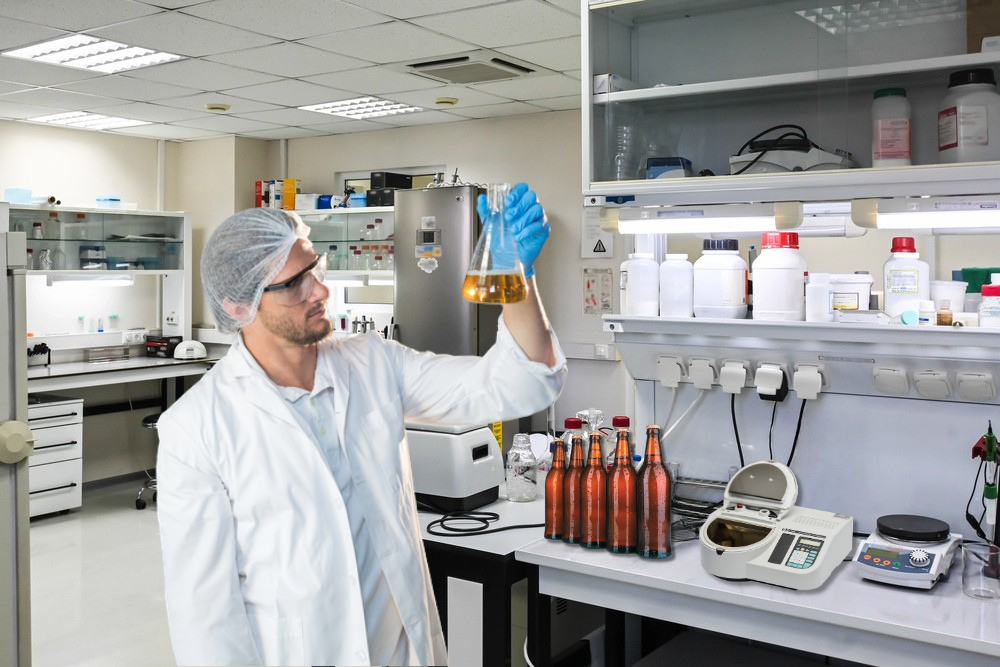How does GC work in Alcohol testing
When you brew beer or cider, you’re not just creating flavour you’re producing ethanol. But how do you know if the ABV on your label is actually...
Discover the essential role of testing in beer production and how it ensures quality control throughout the process. Testing plays a crucial role in beer production, ensuring that the final product meets the highest quality standards. By conducting various tests throughout the brewing process, beer manufacturers can identify and address any potential issues that may affect the taste, aroma, and overall quality of the beer.

One of the key areas of testing in beer production is the detection of nitrosamine formation. Nitrosamines are chemical compounds that can form during the brewing process and have the potential to be harmful to human health. These compounds are known to be carcinogenic and can pose serious risks if present in high concentrations. By regularly testing for nitrosamine formation, beer manufacturers can ensure that their products are safe for consumption.
In addition to ensuring product safety, testing also helps beer manufacturers maintain consistency in their products. By monitoring key parameters such as alcohol content, pH levels, and flavor profiles, brewers can ensure that each batch of beer meets the desired specifications. This is especially important for larger breweries that produce beer on a large scale and aim to deliver consistent quality to their customers.
Furthermore, testing allows beer manufacturers to identify any potential issues with the brewing process itself. By analysing the results of various tests, brewers can pinpoint areas where improvements can be made, leading to more efficient and effective production methods. This not only helps in maintaining quality but also contributes to cost savings and overall operational efficiency.
By investing in quality control measures and having control over testing, beer manufacturers can deliver high-quality products to consumers and establish a strong reputation in the market.

Nitrosamine formation is a major concern for beer manufacturers as it can impact the final product's quality. These compounds are linked to health risks, including cancer, and their presence in beer is strictly regulated. Testing for nitrosamine levels is crucial at different stages of the brewing process to ensure compliance with regulatory standards and protect consumer health.
To mitigate the risk of nitrosamine formation, beer manufacturers can implement various control measures. This includes sourcing high-quality ingredients, maintaining strict hygiene practices, and optimizing brewing conditions. Additionally, the use of advanced analytical techniques, such as chromatography, can help in the accurate detection and quantification of nitrosamines.
By exploring nitrosamine formation and its impact on beer quality, beer manufacturers can take proactive measures to prevent the formation of these compounds and ensure the production of safe and high-quality beer.
Chromatography is vital in beer making, allowing brewers to analyse the chemical composition of their products and detect contaminants. Through advanced techniques, beer manufacturers can identify and quantify substances like nitrosamines, mycotoxins, and pesticides, ensuring their products meet safety standards.
One of the key applications of chromatography in beer making is the analysis of volatile compounds. These compounds are responsible for the unique flavors and aromas found in different beer styles. By using chromatography, brewers can identify and quantify these volatile compounds, allowing them to fine-tune their recipes and create beers with consistent flavour profiles.
Furthermore, chromatography enables beer manufacturers to analyse the stability and shelf life of their products. By monitoring the degradation of key components over time, brewers can ensure that their beers maintain their quality and freshness throughout their intended shelf life.
In summary, chromatography is an essential tool in beer making, allowing brewers to analyse the chemical composition of their products, optimize flavor profiles, detect contaminants, and ensure product stability. By utilising chromatographic techniques, beer manufacturers can deliver high-quality beers that meet consumer expectations.
In the past, beer manufacturers relied on external laboratories for testing their products, which often resulted in delays and increased costs. However, with the advent of advanced analytical systems like Ellutia's 800 series TEA, beer manufacturers can now bring testing in-house, providing them with greater control over quality assurance.
One of the significant benefits of in-house testing is faster turnaround times. With the 800 series TEA system, beer manufacturers can perform tests on-site, eliminating the need to send samples to external labs and wait for the results. This allows for real-time monitoring and immediate action if any issues are detected, ensuring faster production cycles and improved overall efficiency.
In addition to speed, in-house testing also offers cost savings. By eliminating the need for external lab services, beer manufacturers can significantly reduce testing costs, making it a more cost-effective solution in the long run. Moreover, with the 800 series TEA, beer manufacturers can optimise their testing processes, improving workflow and minimising resource wastage.

Another advantage of in-house testing is increased control and traceability. Beer manufacturers have full control over the testing process, from sample collection to analysis. This ensures accurate and reliable results, as well as the ability to trace any issues back to their source. With greater control, beer manufacturers can implement targeted quality improvement measures and continuously enhance their production processes.
Overall, in-house testing with Ellutia's system empowers beer manufacturers with greater control over quality assurance, enabling faster turnaround times, cost savings, and increased control and traceability. By investing in an advanced analytical system, beer manufacturers can elevate their quality control practices and deliver exceptional products to their customers.
Quality assurance is of utmost importance in the beer manufacturing industry, as consumers expect consistent and high-quality products. By having control over testing, beer manufacturers can empower themselves to ensure the highest standards of quality throughout the production process.
With greater control over testing, beer manufacturers can establish robust quality control protocols and standards. By implementing regular testing procedures, breweries can monitor key parameters such as alcohol content, pH levels, bitterness, and flavor profiles. This allows them to maintain consistency and meet customer expectations with every batch of beer produced.
Moreover, having control over testing enables beer manufacturers to proactively address any issues that may arise during the brewing process. By closely monitoring test results, brewers can identify potential deviations from the desired specifications and take corrective measures promptly. This ensures that any quality issues are addressed before the beer reaches the market, maintaining the brewery's reputation and customer satisfaction.
In-house testing also provides beer manufacturers with the flexibility to innovate and experiment with new recipes and brewing techniques. By having control over the testing process, brewers can quickly analyse the impact of different ingredients and brewing conditions on the final product. This allows for continuous improvement and the creation of unique and exciting beer offerings.
By empowering beer manufacturers with greater control over quality assurance, in-house testing enables them to deliver exceptional products, maintain customer loyalty, and stay ahead of the competition in the dynamic beer industry.


When you brew beer or cider, you’re not just creating flavour you’re producing ethanol. But how do you know if the ABV on your label is actually...

When you brew beer or cider, you’re not just creating flavour, you’re also producing ethanol. And if your label says “alcohol-free,” even a tiny...

Nitrosamines, such as N-Nitrosodimethylamine (NDMA), are carcinogenic compounds that can form during the drug manufacturing process and storage under...